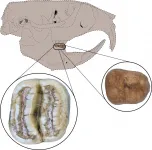"Get out of the water!" Monster shark movies massacre shark conservation
2021-07-15
(Press-News.org) Undeniably the shark movie to end all shark movies, the 1975 blockbuster, Jaws, not only smashed box office expectations, but forever changed the way we felt about going into the water - and how we think about sharks.
Now, more than 40 years (and 100+ shark movies) on, people's fear of sharks persists, with researchers at the University of South Australia concerned about the negative impact that shark movies are having on conservation efforts of this often-endangered animal.
In a world-first study, conservation psychology researchers, UniSA's Dr Briana Le Busque and Associate Professor Carla Litchfield have evaluated how sharks are portrayed in movies, finding that 96 per cent of shark films are overtly portraying sharks as a threat to humans.
Dr Le Busque says sensationalised depictions of sharks in popular media can unfairly influence how people perceive sharks and harm conservation efforts.
"Most of what people know about sharks is obtained through movies, or the news, where sharks are typically presented as something to be deeply feared," Dr Le Busque says.
"Since Jaws, we've seen a proliferation of monster shark movies - Open Water, The Meg, 47 Metres Down, Sharknado - all of which overtly present sharks as terrifying creatures with an insatiable appetite for human flesh. This is just not true.
"Sharks are at much greater risk of harm from humans, than humans from sharks, with global shark populations in rapid decline, and many species at risk of extinction.
"Exacerbating a fear of sharks that's disproportionate to their actual threat, damages conservation efforts, often influencing people to support potentially harmful mitigation strategies.
"There's no doubt that the legacy of Jaws persists, but we must be mindful of how films portray sharks to capture movie-goers. This is an important step to debunk shark myths and build shark conservation."
INFORMATION:
Notes to editors:
* Shark Week is 12-18 July 2021
* Shark Awareness Day is 14 July 2021
Media contact: Annabel Mansfield T: +61 8 8302 0351 M: +61 417 717 504
E: Annabel.Mansfield@unisa.edu.au
Researchers: Dr Brianna Le Busque E: Brianna.LeBusque@unisa.edu.au
Associate Professor Carla Litchfield E: Carla.Litchfield@unisa.edu.au
ELSE PRESS RELEASES FROM THIS DATE:
2021-07-15
About 70-80% of crop losses due to microbial diseases are caused by fungi. Fungicides are key weapons in agriculture's arsenal, but they pose environmental risks. Over time, fungi also develop a resistance to fungicides, leading growers on an endless quest for new and improved ways to combat fungal diseases.
The latest development takes advantage of a natural plant defense against fungus. In a paper published in Biotechnology and Bioengineering, engineers and plant pathologists at UC Riverside describe a way to engineer a protein that blocks fungi from breaking down cell walls, as well as a way to produce this protein in quantity for external application as a natural fungicide. The work could lead to a new way of controlling plant disease that reduces reliance on conventional ...
2021-07-15
What are the fundamental skills that young children need to develop at the start of school for future academic success? While a large body of research shows strong links between cognitive skills (attention, memory, etc.) and academic skills on the one hand, and emotional skills on the other, in students from primary school to university, few studies have explored these links in children aged 3 to 6 in a school context. Researchers from the University of Geneva (UNIGE) and Valais University of Teacher Education, Switzerland (HEP-VS), in collaboration with teachers from Savoie in France and their pedagogical advisor, examined the links between emotion knowledge, cooperation, locomotor activity and numerical skills in 706 pupils aged 3 to 6. The results, to be read in the journal ...
2021-07-15
Contamination of urban lakes, rivers and surface water by human waste is creating pools of 'superbugs' in Low- and Middle-Income Countries (LMIC) - but improving access to clean water, sanitation and sewerage infrastructure could help to protect people's health, a new study reveals.
Researchers studied bodies of water in urban and rural sites in three areas of Bangladesh - Mymensingh, Shariatpur and Dhaka. They found more antibiotic resistant faecal coliforms in urban surface water compared to rural settings, consistent with reports of such bacteria in rivers across Asia.
Publishing their findings in mSystems today, researchers from the University of Birmingham and the International Centre for Diarrhoeal Disease Research, Bangladesh call for further research to quantify the drivers ...
2021-07-15
COVID-19 NEWS: CAN DIETARY SUPPLEMENTS HELP THE IMMUNE SYSTEM FIGHT CORONAVIRUS INFECTION?
Media Contact: Patrick Smith, pjsmith88@jhmi.edu
Johns Hopkins Medicine gastroenterologist Gerard Mullin, M.D., and a team of co-authors published an article May 11, 2021, in Advances in Experimental Medicine and Biology that details the scientific rationale and possible benefits -- as well as possible drawbacks -- of several dietary supplements currently in clinical trials related to COVID-19 treatment.
According to business analysts, the U.S. nutritional supplement industry grew as much as 14.5% in 2020, due in large part to the COVID-19 pandemic.
Mullin, associate professor of medicine at the Johns Hopkins University ...
2021-07-15
GAINESVILLE, Fla. --- Two fossil teeth from a distant relative of North American gophers have scientists rethinking how some mammals reached the Caribbean Islands.
The teeth, excavated in northwest Puerto Rico, belong to a previously unknown rodent genus and species, now named Caribeomys merzeraudi. About the size of a mouse, C. merzeraudi is the Caribbean's smallest known rodent and one of the region's oldest, dating back about 29 million years.
It also represents the first discovery of a Caribbean rodent from a North American lineage, a finding that complicates an idea ...
2021-07-15
A new study by the University of Malta and Staffordshire University highlights an urgent need for change in the curriculum and demonstrates how introducing longer, more frequent and more physically intense PE lessons can significantly improve children's weight and overall health.
Malta currently has one of the highest rates of obesity worldwide with 40% of primary and 42.6% of secondary school children being overweight or obese.
The World Health Organization (WHO) recommends that children engage in at least 60 minutes of age-appropriate moderate-to-vigorous physical activity (MVPA) daily, however ...
2021-07-15
New Rochelle, NY, July 14, 2021-Firsthand reports from nurses in correctional facilities detail the challenges they faced during the COVID-19 pandemic. These firsthand accounts are reported in a special issue on correctional nursing in the Journal of Correctional Health Care. Click here (https://www.liebertpub.com/toc/jchc/27/2) to read the issue now.
Karen Monsen, PhD, RN, School of Nursing, University of Minnesota, and colleagues present the Omaha System COVID-19 Response Guidelines, which provide evidence-based pandemic response interventions used in correctional ...
2021-07-15
Converting light to electricity effectively has been one of the persistent goals of scientists in the field of optoelectronics. While improving the conversion efficiency is a challenge, several other requirements also need to be met. For instance, the material must conduct electricity well, have a short response time to changes in input (light intensity), and, most importantly, be stable under long-term exposure.
Lately, scientists have been fascinated with "coordination nanosheets" (CONASHs), that are organic-inorganic hybrid nanomaterials in which organic molecules are bonded to metal atoms in a 2D network. The interest in CONASHs stems mainly from their ability to absorb light at multiple wavelength ranges and convert ...
2021-07-15
Indiana Jones hates snakes. And he's certainly not alone. The fear of snakes is so common it even has its own name: ophidiophobia.
Kibret Mequanint doesn't particularly like the slithery reptiles either (he actually hates them too) but the Western University bioengineer and his international collaborators have found a novel use for snake venom: a body tissue 'super glue' that can stop life-threatening bleeding in seconds.
Over the past 20 years, Mequanint has developed a number of biomaterials-based medical devices and therapeutic technologies - some of which are either licensed to medical companies or are in the advanced stage of preclinical testing.
His latest collaborative research discovery ...
2021-07-15
Penn State College of Engineering researchers set out to develop technology capable of localizing and imaging blood clots in deep veins. Turns out their work may not only identify blood clots, but it may also be able to treat them.
The team, led by Scott Medina, assistant professor of biomedical engineering, published its results in Advance Healthcare Materials.
"Deep vein thrombosis is the formation of blood clots in deep veins, typically in a person's legs," said Medina. "It's a life-threatening blood clotting condition that, if left unaddressed, can cause deadly pulmonary embolisms -- when the clot travels to the lungs and blocks an artery. To manage DVT, and prevent these life-threating complications, it's critical to be able to rapidly detect, monitor and treat it."
The ...
LAST 30 PRESS RELEASES:
[Press-News.org] "Get out of the water!" Monster shark movies massacre shark conservation





